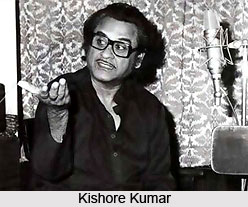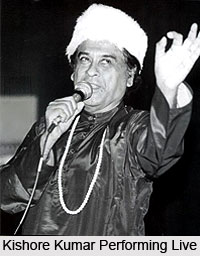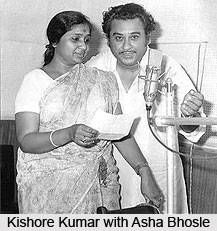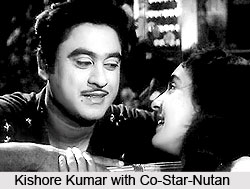 Kishore Kumar, is the synonym for versatility who created a genre of era when it came to songs majestic aura lay in his voice owing to the fact that he possessed amazing dexterity to play with the notes of the sound in the Indian film industry and successfully became a melodious singer, a comic hero, a composer, a filmmaker and so on. The success of Kishore Kumar as a playback singer is immensely because of his golden voice. The `divinely warbled voice" of Kishore Kumar entwined with its sheer charisma and mysticism supported him in establishing himself as an undisputed name in the domain of playback singing. He had been a "baul" and his songs were entwined with the flavour.
Kishore Kumar, is the synonym for versatility who created a genre of era when it came to songs majestic aura lay in his voice owing to the fact that he possessed amazing dexterity to play with the notes of the sound in the Indian film industry and successfully became a melodious singer, a comic hero, a composer, a filmmaker and so on. The success of Kishore Kumar as a playback singer is immensely because of his golden voice. The `divinely warbled voice" of Kishore Kumar entwined with its sheer charisma and mysticism supported him in establishing himself as an undisputed name in the domain of playback singing. He had been a "baul" and his songs were entwined with the flavour.
Arch romantic, inspired, laced with his stormy verve; Kishore Kumar to a great extent redefined the very structure of playback singing in Bollywood. Kishore Kumar as playback singer was both a singer who thought and at the same time a thinker who sang. The saga of Kishore Kumar as playback singer is therefore the tale of a hero who ascended despite thousand odds. He was the one who was able to give the songs his own interpretations either by the means of his mindless yodelling or through the rhyming verses made of words that otherwise do not have any meaning.
Success of Kishore Kumar as playback singer did not come in one day. With a constant ripple in his mind to create a system of his own, Kishore Kumar tried his fate as a playback singer in Bollywood. He once approached S D Burman who had given him an opportunity in Pyar (1950) where interestingly he had sung for the actor Raj Kapoor. His style impressed SD Burman and he offered him more singing work. He sang the song Qusoor Aapka in Bahar (1951), which became a huge hit. As he got more singing assignments, he was simultaneously featured as the lead in films.
 Kishore Kumar as a playback singer was initially not given much importance and he sang lighter songs by Burmanda and other music directors. But after his soulful melody of Dukhi Man Mere from Funtoosh (1956), Kishore Kumar was taken seriously as a singer. Though he was formally inexperienced, he blended jazz-scat disjointed musical notes into a rhythmic progression and once its beat was established, deceased from the pattern and combined notes and words and syllables into new kinds of musical accord. Kishore Kumar went ahead to forge his own style; his very own ‚lan; his philosophy of music.
Kishore Kumar as a playback singer was initially not given much importance and he sang lighter songs by Burmanda and other music directors. But after his soulful melody of Dukhi Man Mere from Funtoosh (1956), Kishore Kumar was taken seriously as a singer. Though he was formally inexperienced, he blended jazz-scat disjointed musical notes into a rhythmic progression and once its beat was established, deceased from the pattern and combined notes and words and syllables into new kinds of musical accord. Kishore Kumar went ahead to forge his own style; his very own ‚lan; his philosophy of music.
Kishore Kumar was the second golden male voice that the film industry has ever produced. In a career across 42 years, Kishore Kumar recorded around 2,905 songs. The first being an ensemble number, Baankaa sipahiyaa ghar jaaye ho for a film Eight Days, released in 1946. His first solo song was Marne ki duayein kyon maangoon for the film Ziddi in 1948 and his last song was a duet with Asha Bhosle, Ae guru aajaao for Waqt Ki Awaz in 1988. Overall, he is known to have sung 2,648 Hindi songs, 154 Bengali, eight Gujarali, and four Bhojpuri, three each in Marathi and Oriya, and one each in Assamese, English, Punjabi, Kannada and Malayalam. Other than these, he had recorded 80 non-film songs; 67 in Bengali and 13 in Hindi.
 The number of songs Kishore Kumar do not however, account for the iconic status he holds in the history of Hindi film music. The impact of Kishore Kumar as a playback singer has over successive generations of music lovers. His contemporaries were Mukesh, Mohammad Rafi, Talat Mahmood and Manna Dey. In 1969, he took away most of their fame and at one stroke with the film Aradhana and since then, has ruled as the indisputable king of the disc for nearly two decades. Very soon he became the "voice" of almost every top Hindi hero, starting from Dev Anand to Rajesh Khanna to Sanjeev Kumar, Randhir Kapoor, Mithun Chakraborty and of course, Amitabh Bachchan. All of the mentioned actors, without exception, do owe their success in some way or the other to this inimitable warbler.
The number of songs Kishore Kumar do not however, account for the iconic status he holds in the history of Hindi film music. The impact of Kishore Kumar as a playback singer has over successive generations of music lovers. His contemporaries were Mukesh, Mohammad Rafi, Talat Mahmood and Manna Dey. In 1969, he took away most of their fame and at one stroke with the film Aradhana and since then, has ruled as the indisputable king of the disc for nearly two decades. Very soon he became the "voice" of almost every top Hindi hero, starting from Dev Anand to Rajesh Khanna to Sanjeev Kumar, Randhir Kapoor, Mithun Chakraborty and of course, Amitabh Bachchan. All of the mentioned actors, without exception, do owe their success in some way or the other to this inimitable warbler.
Kishore`s own success is attributed to that grand old stalwart among music composers Sachin Dev Burman. Although the credit for recognizing the potential of Kishore Kumar as playback singer is given to composers like Saraswati Devi and Khemchand Prakash, who gave him his break in playback singing. Sachin Dev trained Kishore under his wings in 1950 (with Pyaar, Baazi, Bahaar and so on) and together they came up with some of the most unforgettable hits in Hindi cinema. There were of course, many others like Madan Mohan, O.E Nayyar, Kalyanji-Anandji and Rahul Dev Burman who came in later and were to shape his career in varied other ways. But with Sachin Dev, the co ordination between the two living legends was different. Kishore often took the liberty of composing on behalf of his "guru" without even claiming credit for those tunes. Their relationship was almost like father and son.
Kishore Kumar as a playback singer trusted himself more than anybody else. He was supremely confident of being a successful singer and credited his voice as a naturally gifted one. Kishore Kumar was one of the rare singers who did not imitate anybody while singing and also did not take formal training in music. He found an idol in K.L. Saigal. But he was there more for inspiration than emulation. The unique timber, his matchless tonal pitch further supported in establishing Kishore Kumar as playback singer whilst showcasing his rare talents. Even if Kishore Kumar sang at the topmost pitch, his voice never cracked. He changed his scale without any effort. A man who knew nothing about classical music had risen to such great heights is quite incredible - but it did happen. Kishore used the aada chautaal beat in his film, Jhumroo (1961), from an inspiration. Ashok Kumar used to narrate another tale about Kishore`s inborn musical sense. He had a mysterious premonition of exactly which composer would prefer what kind of tune to a particular song. Once Kalyanji-Anandji had scheduled a rehearsal four days prior to the actual recording, but Kishore Kumar went in directly on the day of the recording. Kalyanji was annoyed, but Kishore Kumar went forward to play the exact melody on the harmonium that was expected by Kalyanji.
 Manna Dey encountered a similar situation while recording the memorable duet, Ek Chaturnar with Kishore for the film Padosan in 1968. Sachin Dev`s son, Rahul Dev Burman or Panchamda was the composer. As usual, Kishore kumar did not arrive for the rehearsals, but on the day of recording, Kishore recorded the song only after capturing the soul of the piece. His performance was a lour deforce in improvisation - as said by RD Burman.
Manna Dey encountered a similar situation while recording the memorable duet, Ek Chaturnar with Kishore for the film Padosan in 1968. Sachin Dev`s son, Rahul Dev Burman or Panchamda was the composer. As usual, Kishore kumar did not arrive for the rehearsals, but on the day of recording, Kishore recorded the song only after capturing the soul of the piece. His performance was a lour deforce in improvisation - as said by RD Burman.
One advantage Kishore Kumar as playback singer enjoyed over other playback singers of his time was that he could "enact" songs. Since, he had already faced the camera and knew the film medium inside out. It was therefore essential that the director convinced him about the situation of his song - who it would be picturised on and how it would help in taking the narrative forward. The director also made the dramatic highlights clear. He would then perform the song, sated with all the nuances and expressions that the actor would portray on screen. Music composers knew that jumping and enacting was his way to capture the spirit of the song he rendered.
Kishore Kumar as playback singer had experimented and worked upon the singing styles of classical gurus like Ustad Bade Gulam Ali Khan and Pandit Bhimsen Joshi. Later, in privacy he would emulate them with effortless ease. Contrary to his image of a light-hearted entertainer, he was actually a serious student of music. He also learnt Rabindra Sangeet on his own.
Kishore Kumar was a fan of the Swiss singer Tex Norton and the Australian Jimmy Rogers. But he learnt the art of refined yodeling from his brother Anoop Kumar. While in Khandwa, both brothers had comprehensive a huge collection of gramophone records of yodelers. Kishore Kumar is one of the singers in Indian film industry who has not only set a unique trend of natural singing but also innovative touches to the natural piece of art.
For all Kishore Kumar`s talent, eccentricity, fame and chaotic behavior, he was at heart, a humble soul. He recognized genius when he saw one and never stood on issue in having his way through. Kishore Kumar as playback singer remained at the top till the very end giving way to a major heart attack in 1987. His physical absence may have had orphaned music rich oeuvre of songs and continues to flutter in the hearts across generations.






